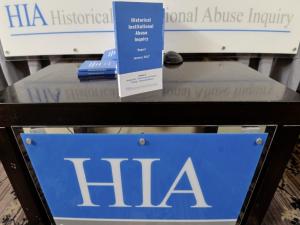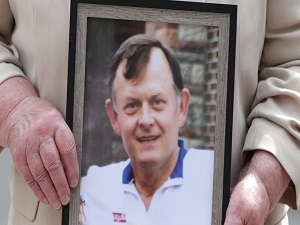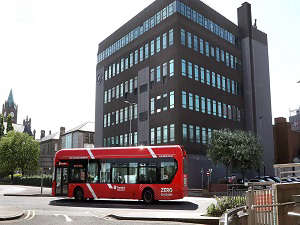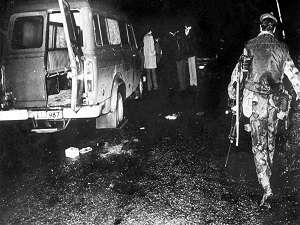
By David Young
Northern Ireland's top judge has branded as shocking the ongoing failure to compensate victims of historic abuse in the region.
Sir Declan Morgan said the delay exemplifies how the Stormont impasse is negatively affecting citizens.
The Lord Chief Justice expressed hope that the long-awaited redress scheme might finally progress in the coming months.
Sir Declan used his speech marking the start of the new legal term to pay tribute to the former judge who chaired the Stormont-commissioned inquiry into institutional abuse.
Sir Anthony Hart died of a heart attack in July.
Redress payments recommended by Sir Anthony have been on ice for more than two-and-a-half years due to the collapse of the devolved institutions, and the Government has been under intense pressure to sanction the outstanding payments at Westminster.
"Sir Anthony was held in the highest regard," Sir Declan said on Thursday.
"He was an outstanding judge who exemplified the highest levels of integrity and he consistently displayed his dedication to public service.
"It is shocking that the recommendations outlined in the Report into Historical Institutional Abuse, launched by Sir Anthony on 18 January 2017, have yet to be implemented.
"He had expressed to me his profound disappointment that the victims were still awaiting action.
"I understand work is in hand and a positive outcome should be achievable in the coming months. However, I would ask that the necessary legislation is driven forward as soon as possible so that Sir Anthony's work is fulfilled and the victims are given the redress that is so long overdue.
"The lack of progress for victims of historical abuse epitomises how the lack of an Assembly impacts negatively on the lives of Northern Ireland's citizens.
"There are many other areas where legislation and ministerial decisions are essential to tackle difficult issues and address shared social problems."
Sir Declan welcomed the fact that the Government had finally agreed to release funding to process the backlog of legacy inquests relating to the Troubles in the Coroners' Courts.
The region's top judge had asked for the funding in 2016, but its release was caught up in the political deadlock at Stormont.
On Thursday, he called for progress to establish other stalled outstanding legacy mechanisms proposed in the 2014 Stormont House Agreement.
"Legacy inquests are but one part of the jigsaw," he said.
"The Northern Ireland Office has consulted on the Stormont House Agreement Bill which outlines a number of institutions other than the Coroners' Courts for dealing with the past.
"The lack of progress in establishing structures to deal with the legacy of our past means that those who seek truth, justice or information often feel that they have no option but to come before the courts to get those answers. That is not an appropriate or effective way of dealing with those issues."
He said the use of the courts to address legacy issues was placing an "impossible burden" on the system.
"It is not part of my role to enter the political fray but I have always said there is a need for both political agreement on the mechanism for dealing with the past and significant additional resources if we are to move forward in any meaningful way," he said.
Sir Declan added: "I and the judiciary are committed to doing everything we can to assist in dealing with the past."
The senior judge said he and colleagues had met representatives from the main Stormont political parties during the summer to discuss a range of issues.
"I have always said that my door is open," he said.
"It is important that the judiciary remain independent and impartial but judicial independence does not mean judicial isolation. There is much to be gained on both sides from appropriate discussion between judges and local politicians about the way in which we can improve the administration of justice."
Sir Declan told the invited audience at the Royal Courts of Justice that he did not intend to say much about Brexit, though he expressed hope that cross-border collaboration on judicial matter would continue.
"The eagle-eyed among you will have noted that I have not yet referred to Brexit," he said.
"Unlike some others, I have little to say. The future arrangements are unclear. I recognise, however, that this jurisdiction will be the only part of the United Kingdom having a land border with the European Union after Brexit.
"We already have sensible judicial liaison arrangements to deal in particular with family law cases and I expect that the judges of our neighbouring jurisdiction will assist us in ensuring that practical issues arising in the justice system will continue to be addressed within the scope of the legal options available to us."


 Government moves to secure Supreme Court appeal option in Sean Brown case
Government moves to secure Supreme Court appeal option in Sean Brown case
 Closure of BT office in Londonderry would be ‘devastating’ blow, says Eastwood
Closure of BT office in Londonderry would be ‘devastating’ blow, says Eastwood
 Withdrawal of critical veterinary medicines could have ‘severe impact’ on NI
Withdrawal of critical veterinary medicines could have ‘severe impact’ on NI
 Watchdog identifies series of failings in investigation of Kingsmill Massacre
Watchdog identifies series of failings in investigation of Kingsmill Massacre
 Kneecap at Glastonbury ‘a matter for organisers’ says Cooper
Kneecap at Glastonbury ‘a matter for organisers’ says Cooper